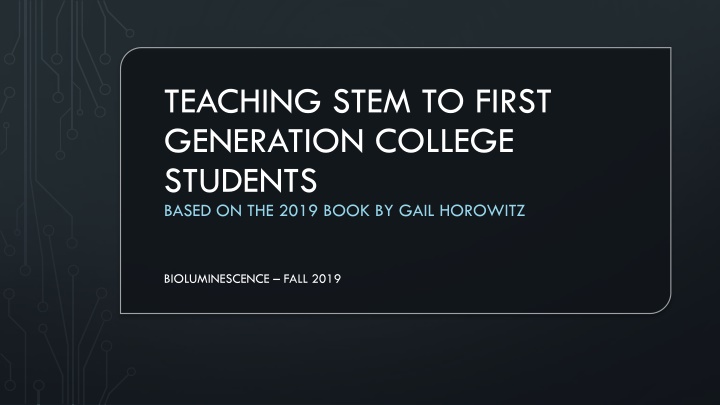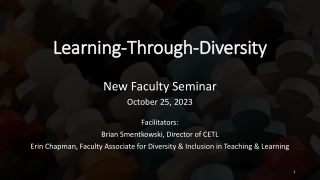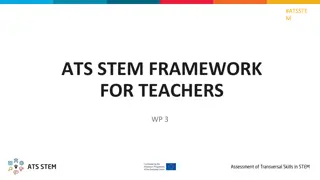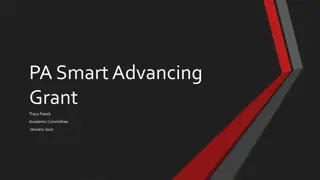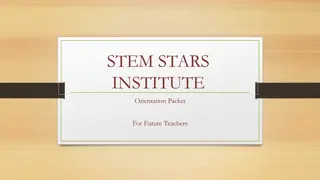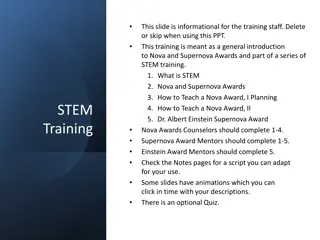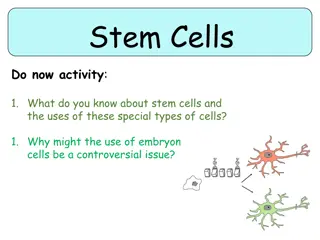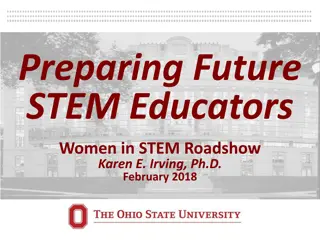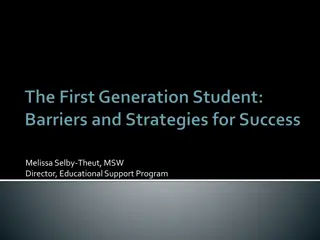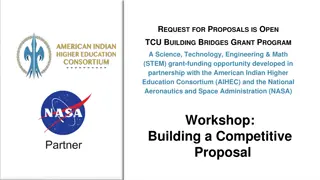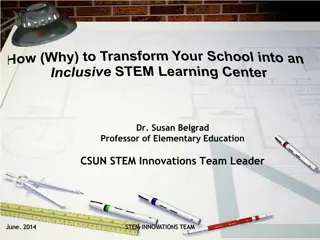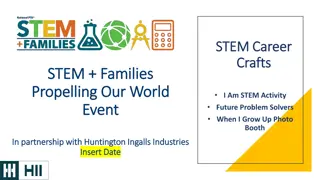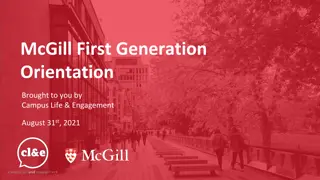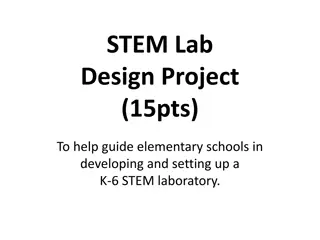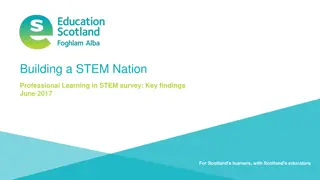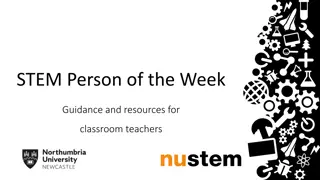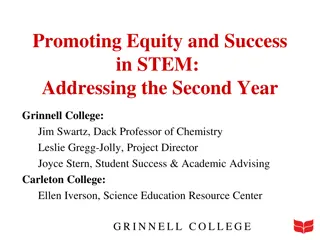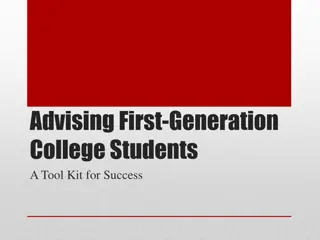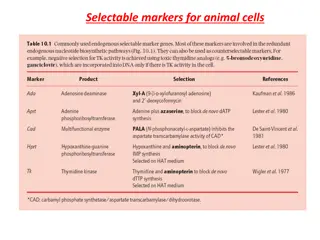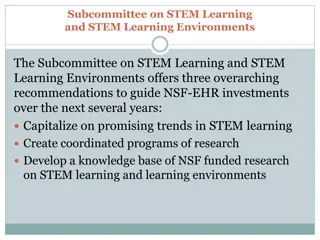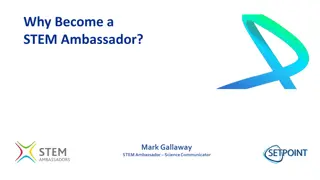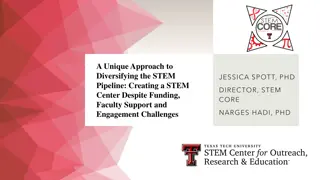Supporting First-Generation College Students in STEM Education
Understanding the challenges faced by first-generation college students in STEM fields is crucial for their academic success. These students often encounter barriers such as lack of social and cultural capital, limited college resources, and perceptions of a less supportive college environment. By addressing these disparities and providing targeted support, we can help enhance the achievements of first-generation students in STEM courses.
Download Presentation

Please find below an Image/Link to download the presentation.
The content on the website is provided AS IS for your information and personal use only. It may not be sold, licensed, or shared on other websites without obtaining consent from the author.If you encounter any issues during the download, it is possible that the publisher has removed the file from their server.
You are allowed to download the files provided on this website for personal or commercial use, subject to the condition that they are used lawfully. All files are the property of their respective owners.
The content on the website is provided AS IS for your information and personal use only. It may not be sold, licensed, or shared on other websites without obtaining consent from the author.
E N D
Presentation Transcript
TEACHING STEM TO FIRST GENERATION COLLEGE STUDENTS BASED ON THE 2019 BOOK BY GAIL HOROWITZ BIOLUMINESCENCE FALL 2019
Broadest definition: Individuals whose parents have not participated in post secondary education, and who themselves have no education beyond high school Used by National Center for Education Statistics and the Higher Education Research Institute WHO IS A FIRST- GENERATION COLLEGE STUDENT?
BARRIERS TO COLLEGE SUCCESS Compared to their peers with college-educated parents, first- generation students: Are more likely to leave college and less likely to earn a degree Are more likely to enter higher education at public 2-year colleges and less likely to enter at public 4-year colleges Nearly 90% of first-generation college students fail to graduate within 6 years of enrollment.
Individuals who are first-generation college students tend to also have social/demographic factors associated with limited college success: Age (over 24) Employed full-time Financially independent and/or supporting dependents Low income Black, Latino/a WHAT ACCOUNTS FOR THIS DISPARITY?
Issues related to: Social and cultural capital Lack of knowledge of higher education Lack of use of college resources Lack of network College engagement Less engagement Lower understanding of importance of engagement Perception of college environment as less supportive WHAT ACCOUNTS FOR THIS DISPARITY?
SUCCESS IN STEM Why do some students perform better in STEM courses? Author s experience: Success in Organic Chemistry I was tied to prior performance in General Chemistry II. Why? Due in part to skill set possessed by successful science students: knowing how and when to seek help
SUCCESS IN STEM Why do some students perform better in STEM courses? Other researchers: Study behaviors of organic chemistry students predicted performance and outweighed other predictive factors such as prior GPA Successful organic chemistry students starting studying and engaging in help seeking behaviors earlier in the semester
SELF REGULATED LEARNING (SRL) A process in which individuals monitor their own learning processes, employ strategies to meet their goals, and modify their behaviors in response to feedback Research: At risk students trained to review and correct their own quizzes in a math course outperformed control students by 25% General chemistry students attending a 50-minute study and learning strategies session outperformed the control group by one letter grade
FIRST-GENERATION STEM STUDENTS AND SRL First-generation STEM students often lack knowledge of how to study effectively and how/when to seek help. First-generation STEM students benefit from training in self-regulated learning. Instructors are professional students, potentially taking study skills for granted.
INCORPORATING SRL INTO THE CLASSROOM Is it a lot of extra work? I am not an educational methods expert! Who is the best person for the job? How can I be a more effective instructor of first-generation students?
FOCUS ON THE POSITIVE: First-generation college students can be a joy to teach. You communicate your beliefs and expectations to your students. You can convince students that STEM is something they can do with the right amount and type of effort. You can tell students how to be successful.
PROVIDE GUIDEPOSTS ALONG THE WAY: Content: When a more difficult topic is about to come up Which topics are most crucial Which topics are foundational and will matter later in the semester
PROVIDE GUIDEPOSTS ALONG THE WAY: Skills: What specific skills they are expected to master How those skills must be combined
PROVIDE GUIDEPOSTS ALONG THE WAY: Homework: Assign specific problems Scaffold homework assignments Differentiate between specific and broad questions Select appropriate online resources
PROVIDE FREQUENT FEEDBACK: Students are not necessarily good at evaluating how well they did on exams: The Famous Kruger Dunning Effect
PROVIDE FREQUENT FEEDBACK: Prompt feedback is necessary for students to evaluate their learning Examples: Posting answer key immediately after an exam Online homework that can customize feedback Posting grades in LMS Calculating overall grade in course during the semester
PROVIDE OPPORTUNITIES FOR SELF-REFLECTION: Exam wrappers: Written exercise to be filled out by students following a quiz or exam Encourage students to review their exam, errors, and overall performance and reflect on their studying Are students satisfied with their performance? How might they prepare differently in the future? Can also have a pre-exam element Carnegie Mellon website: https://www.cmu.edu/teaching/designteach/teach/examwrappers/
WRITE EFFECTIVE EXAMS AND QUIZZES: Provide clear instructions: Make sure all exam instructions are written clearly and correctly Make sure all exam questions are worded carefully Try to display questions in the clearest possible layout
WRITE EFFECTIVE EXAMS AND QUIZZES: Is the exam too long? Overly long exams do not necessarily accurately assess what students know, but who is most familiar with competitive timed exams.
WRITE EFFECTIVE EXAMS AND QUIZZES: Discuss exam format in advance: Provide examples Allocation of points and time: Difficult and time-consuming questions should be worth more points Important topics should carry more weight Vary difficulty level of questions: This provides useful feedback for students
ENCOURAGE QUESTIONS: Avoid: Is this clear? Try: What about this is not clear? or What is the most confusing aspect of this? and then wait Ask students to submit anonymous questions on note cards
ENCOURAGE LOW-STAKES PARTICIPATION: High risk scenarios only encourage the most confident / strong students Encourage students to work in groups to solve problems Ask very specific (limited choice) questions when problem-solving with the class
DISSEMINATE INFORMATION BROADLY AND REPEATEDLY: First-generation students are often at a disadvantage in their ability to understand and assimilate the rules associated with the course. Don t change things that are in the syllabus! Use multiple formats for announcements. Post resources.
BIG FINISH: USING THESE TECHNIQUES TO BECOME A MORE EFFECTIVE INSTRUCTOR OF FIRST-GENERATION STUDENTS: Is not difficult. Can involve gradual changes. Will become second nature. Helps ALL students.
